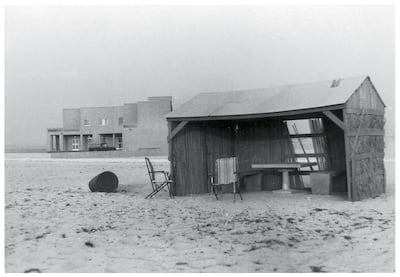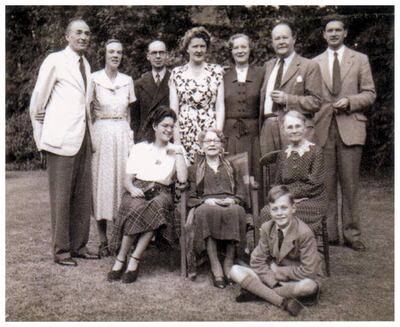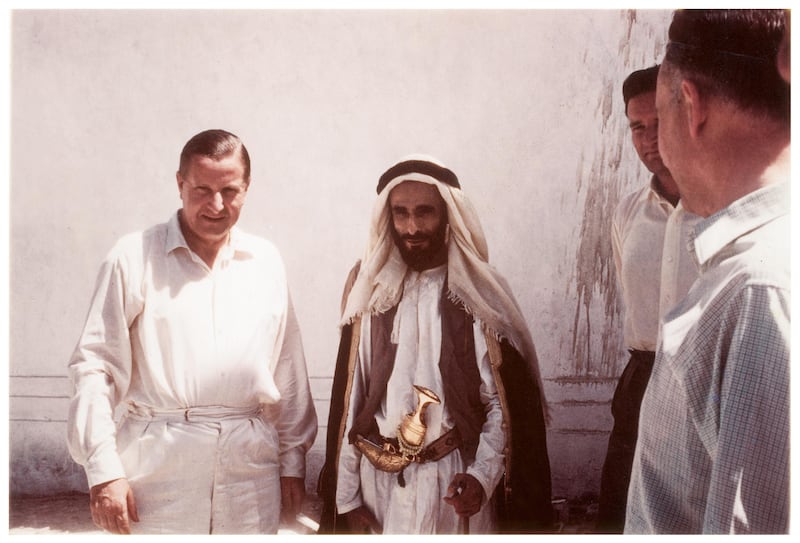Abu Dhabi in 1956 was a very different place. When Honor Cowell, then Cuthbert, arrived with her husband Ian, the house she was to live in stood a little back from the shore, surrounded on all sides by desert sands that swept down to the sea.
"It was just our house, the customs house and the fort. The rest were all barasti huts made from palm trees," she recalls, describing a time long before the skyscrapers that now line the Corniche.
"My grandmother had never heard of Abu Dhabi or Dubai, or any of the emirates that then made up the Trucial States: "I called it the Crucial States in a letter home," she tells me.
"I was quite right there though," she says. "They did turn out to be crucial states."
Cowell's husband had been appointed local director of the British Petroleum and Total-owned Abu Dhabi Marine Areas (ADMA), which had obtained an offshore concession. He was sent out to act as a liaison between the company and Sheikh Shakhbut bin Sultan Al Nahyan, Abu Dhabi's ruler at the time.
Cowell remembers the day oil first came across to the mainland from Das Island. "The drilling superintendent was called Wainwright. He was a Yorkshire man, very bluff. I liked him very much indeed," she says.
"I remember him holding up a test tube sample from the first batch and saying, 'There's plenty of it'. It was greasy, mucky looking stuff, no relation to what we know as oil."

After that, Abu Dhabi's fortunes changed. "The millions started rolling in – that would have been in 1958 or round about that era," she remembers.
Occasionally, the gold paid for the oil concession would be stored overnight at the couple's house.
"It stayed in my wardrobe until Ian went to see the Sheikh the next morning, so I used to have the most expensive wardrobe in the Middle East," Cowell says.
Prior to this, the main industry was pearl diving, which declined significantly after the invention of the Japanese cultured pearl in the 1920s and 30s.
Cowell recalls the particular beauty of the natural pearls that local men, often with no equipment but a nose hook, would dive down for, minutes at a time, to procure from Abu Dhabi's sea floor. She still possesses a string of these rare ornaments, gifted to her by Sheikh Shakhbut, whom they came to know quite well.
"The Sheikh would come in when I was visiting the women and either give me a bunch of carrots or some jewellery," she says, explaining that vegetables in the arid state were highly valued.
"We used to walk along the shoreline together in the mornings and watch the pearl divers come in. The Sheikh liked those pearls. They were the famous yellow variety and had a particular shape; you don't see them now."
While her husband attended the Sheikh's majlis, Cowell was regularly invited to socialise with women. "At first they were all masked and veiled and I couldn't tell one from the other so I addressed all my comments to the lady opposite me wearing the most jewellery."
It was Cowell's 2-year-old son Neil who broke the ice by running amok and clambering over the cushions until his mother told him to behave.
"The women told me to let him be. He was a boy you see. He had fair hair and blue eyes and they doted on him."
Cowell spoke little Arabic, but after a while they got to know one another better and the women removed their veils. "Their faces were permanently marked from the leather masks they wore. There was no air-conditioning so it left stains on the skin."
Sheikh Shakhbut's mother, Sheikha Salma, used to try to improve Cowell's Arabic, teaching her three new words a week. "If by the next time I had forgotten them, she'd slap the back of my hand with her fan and make tutting noises."
The women would sit cross-legged on the floor, which was layered with exquisite carpets. "There were about 12 of them heaped on top of one another," Cowell recalls.
Read more: Former expat shares tales from early years of Dubai in her blog
A portrait of King George V hung on the wall and in one corner was a wardrobe stacked with crockery. "They never used it, it was just piled up there. I always reckoned it must have been a ship that went down and this was the stuff they rescued."
Cowell brought the women gifts, including a pair of binoculars that they would use to look for her arrival. "When they saw the Land Rovers coming in they'd know I had come back to Abu Dhabi, then a message would come round saying would I please go and visit them."
Cowell also brought the women magazines from England, something they had never seen before.
"They held them upside down and when they saw pictures of stockings they hooted with laughter. I had to explain to them what they were for and why."
Pictures of winter clothing and underwear also caused confusion. "They were very curious as they'd never seen such things as bras or hats or umbrellas before and they went into fits of laughter."
They were fascinated by the off-shoulder dresses too. "One time I was requested to go dressed as I would in England on an evening out so I went in a strapless evening gown and they couldn't resist that."
At times though, it was lonely being one of the only western woman in Abu Dhabi. Cowell would receive occasional visits from local women, although she never interacted with the men. "They were polite but wouldn't speak to me. It was just the custom."
A large medicine cabinet in Cowell's hall also helped to break the ice. She says: "Once they realised I had that, the women would come to me for minor cuts and ailments".
Occasionally, the couple were invited to events at Qasr Al Hosn, where they also met Sheikh Zayed bin Sultan Al Nahyan, Founding Father of the UAE.
"He was very much a desert man, Sheikh Zayed," says Cowell, "we got on fine".
Now in her 80s, Cowell has only returned to Abu Dhabi once since she left, when she visited family now living in Dubai. She hardly recognised her former home.

"There were no roads in my time so we always went in two Land Rovers in case one got stuck. It used to take five hours so we'd set off for Dubai at five in the morning to avoid the heat."
Cowell's abiding memory is of walking along the Abu Dhabi shoreline.
"It was totally different in my day. The desert just met the sea," she says.
"I remember saying it felt like I'd gone from the 20th century to the 10th century. It was staggering to come from civilisation to nothing."





